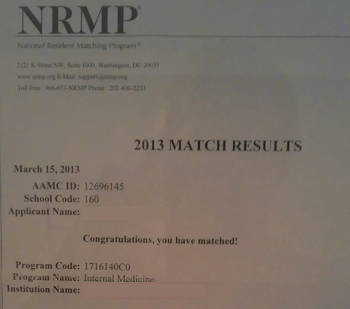Why medical students do not match
Its that time of year again where resident physicians are matching to fellowship and medical students are winding down their interviews to create their rank list. I remember this part of my medical career quite well. I was very excited for the upcoming change for more responsibility and actually become a doctor, but at the same time terrified that I might not match. This post will focus on why some individuals do not match. It will also include two examples from personal friends who did not match. According to NRMP, 41,334 people applied to the match in 2015 with only 30,212 positions in existence. Breaking these numbers down even more, 17,000 allopathic graduates and 9000 other graduates applied to 27,000 first year positions. Most of the unmatched positions end up being international medical graduates, but each year there are several graduates from each US school that fail to match.
My greatest fear during fourth year of medical school was what would happened if I didn’t match. United State medical graduates have almost $200k in debt and I was no exception. Each day that grew closer to match day, I became increasingly anxious what would happen with my loans if I failed to match. I became fixated on how I would ever pay them off if my nightmare became true. This worst fear became a reality for two of my friends and below is the story as to why they felt they did not match. Their names have been changed to give them privacy.

Ted (ER)
Ted is still my good friend today. We met first year of med school and became quick friends. He is a non traditional applicant. Before going to medical school he worked as a professional musician and toured all over the country. For many different reasons he decided to eventually give up that lifestyle and go back to school to get his MD. Ted seemed to be an average to slightly above average medical student with his class rank, graduating in the top half of the class. He seemed to do well until he received a bad mark against him for professionalism while on OB/GYN. Since I was not there all I can go off of is his account of what happened.
Red Flag
He claims that he was told that he had some time off at the end of a rotation to study for his exam. According to him, the resident let him off and this did not get relayed to the attending. Once the rotation was over he noticed that this attending gave him a bad mark on his evaluation since he did not come in to work when he was scheduled to, so the attending thought. He only noticed it after the rotation was over. The attending reported to the program director that he “decided” not show up for the last several days of the rotation without any notice. Ted tried to get the negative remark removed from his deans letter but to no avail. The dean told him that it was clear in the orientation manual that all days off need to be scheduled with the attending and given the okay by the attending on service at the time of the day off. The negative comment stayed on his deans letter at the time of applying to residency. He was slightly concerned but was happy it was in a rotation that he was not applying to residency in.
Did not apply broadly enough
Since Ted took time off between undergraduate and med school, he ended up being the same age as the program director for the ER program. They actually knew each other in college and were good friends. There was never anything explicitly stated between the two in regards to residency application to my knowledge. However, since they were good friends he assumed he had an inside advantage. He kept telling me how he goes to dinner at the program directors house, goes fishing with him from time to time and felt like it was a sure thing. Ted ended up raking the program number one and was so confident that he started going house hunting. When match day came he ranked the program where his friend was program director and became really surprised when he found out he didn’t match. I remember the program director calling him to say something along the lines of “its just business” and he doesn’t make all the decisions to who gets ranked the highest. There was a long exchange between the two that was surprisingly professional on Ted’s part. Because of this friendship he assumed that he could apply less broadly since he thought it was an unspoken bond that would lead to an automatic acceptance to the program.
Scrambling for a spot via SOAP
In the end he did not match and went though the SOAP process to find an unfilled position. He was about to take a job as an internal medicine resident but withdrew from the SOAP saying that he would then try again next year. He recalled how unfulfilled he was on IM rotations and did not want to take a position that he knew he would be very unhappy with. Instead of accepting the position offered to him in the SOAP process he withdrew his application.
After the shock wore off, he spent the subsequent days emailing ER program directors across the nation about his situation to see if they had any open spots. About a month later one program replied that one of the newly accepted residents had to withdrawal due to undisclosed issues and they wanted to interview him. He flew out the next day, they gave him an interview on the spot including running a mock code. Once that was over they went to lunch where they put the contract on the table which he quickly signed. Later that day he rented an apartment and flew back to town where he started packing his things. The following week he moved everything across the country in a truck to this new city and started work.
There were a lot of challanges for Ted, but in the end it all ended up working out for him. He became a resident in the field that he wanted to go into. This year he graduated and is now an ER attending at a university affiliated program. Every time I talk to him he seems to love his job and has no regrets with how things turned out. He tells me that he has no hard feelings towards the program director that did not accept him and that it was his mistake to assume it was a sure thing.
Kim OB/GYN
Kim and I became friends my first year of medical school a few months before I met Ted. She was in an organization that I was also involved with. Over the first few months of medical school we got to know each decently well. She wanted to to OB/GYN and seemed like the type of person who was very smart and outgoing.
Between the times of being outgoing and running several organizations, she would go days to weeks without being seen or heard from. After her “radio” silence was up she then would throw a big party at her apartment and go back to being very social. We all figured that she would disappear to be very diligent about studying since she would always be very social after exams were over. We figured that she was what many would call a “gunner” and that she was highly dedicated to her studies.
Hidden past with red flags
It was not till half way through my first year that I learned that she was actually repeating the first year. When I asked her about it she just said that she had some family issues and needed to take time off. Out of respect for her family I left it at that and never brought it up to her again since I figured she would talk to me about it if she needed to.
We remained friends throughout med school till fourth year when we decided to move in together along with two other roommates into a four bedroom house. This is when my friends and I realized that something was not as it seemed. She would go days without leaving her room, leaving us to wonder what was going on since she did not have any tough rotations to worry about. We also did not see her leave the house to go one more than 2-3 interviews when it came time for interview season.
Her behavior before match day grew more erratic and we eventually called her family to come into town since we were worried about her well being. This is when we found out that she applied to residency 3 weeks after the application opened and that she received only 2 interviews.
She of course did not match and entered into the SOAP process. She did a transitional year as a surgical resident and seemed to do well. She reapplied to OB/GYN 3 times in total and in the end was never successful. The fourth time she applied to family medicine and was accepted the last I had heard. She has since then cut off contact with myself and all mutual friends that we share, so unfortunately this is where the update ends.
Main reasons why someone does not match:
- Did not apply broadly enough
- Applied to a competitive specialty as a non competitive applicant with no back up (One person from my med school class applied to plastics while he was in the bottom half of the class with no publications with no general surgery programs as back up. He did not match)
- Red / Yellow flag on record without an explanation
- Poor interview skills
Overcoming a red flag
Another one of my friends applied to pediatrics with a red flag on her application and still matched. It is possible to overcome a red flag on an application but there needs to be a good explanation. In her case her red flag was that she failed step one. She explained that her father was diagnosed with pancreatic cancer and died from the disease one week prior to the exam. She thought she was mentally ready to take the test but obviously this was not the case. I asked her why she took the test two days after she buried her father and she told me that he wanted me to keep being me. He told her to keep going, he’s proud of her, and that he doesn’t want her to slow down on his account. She took that to mean that she should not take time off which ended up being a mistake. She was declined from a lot of competitive programs most likely due to potential cut offs for step scores. However, in the end she matched her first ranked program and is now in fellowship doing very well.
There are many reasons why a medical student will not match, and most of the time there is a red flag somewhere in the application, wither it is on paper on in person during the interview. Put your best foot forward and know that even if disaster strikes by not matching, it doesn’t have to mean the end of your medical career.





Interesting stories. A blemish on your record can be difficult to overcome. And with so many qualified and overqualified applicants for competitive spots, most residency program coordinators will play it safe and go with the applicant without the demerits.
Best,
-PoF
Pingback: Wednesday Around the Web – 12/14/2016 | Life of a Med Student